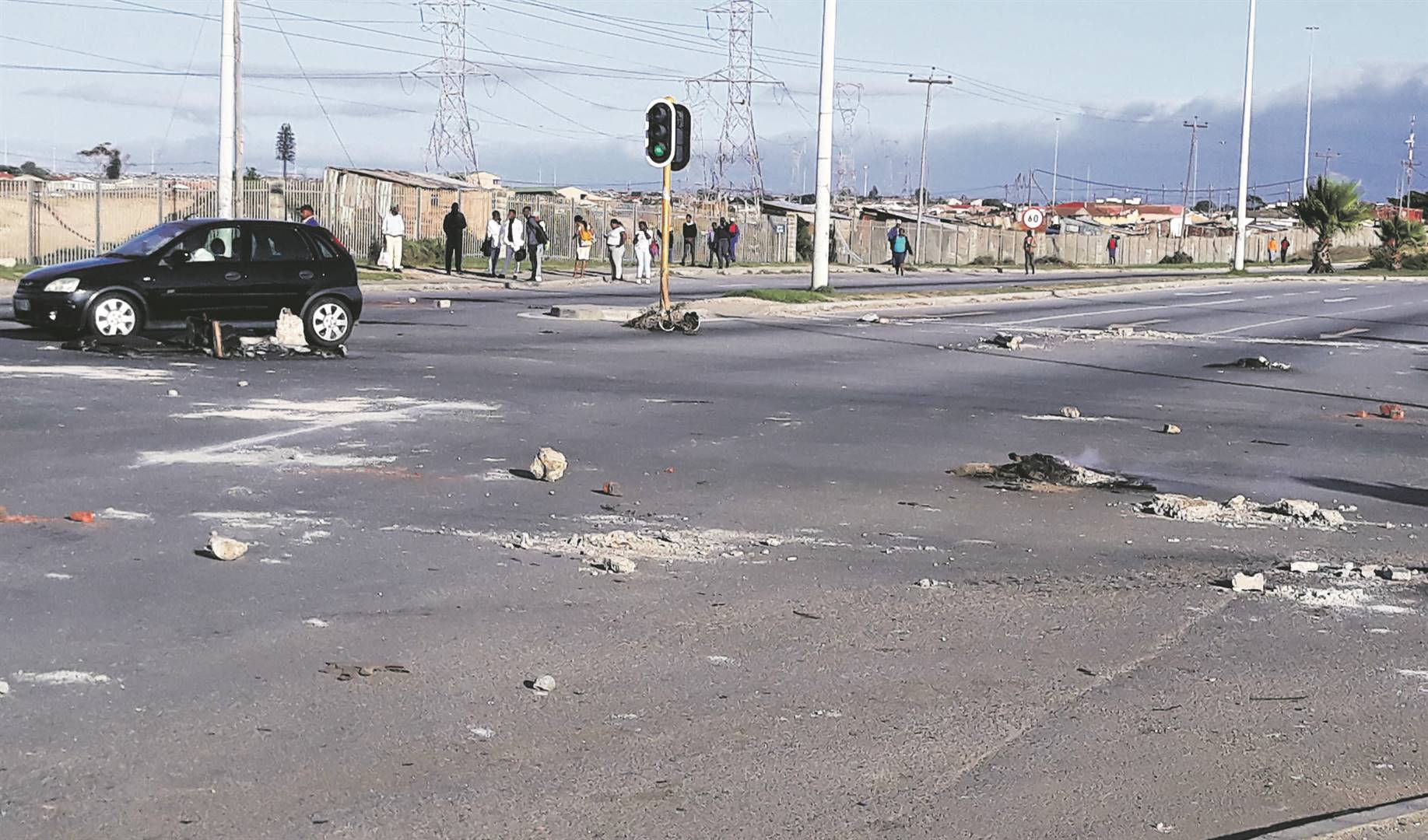
What happens when the dust settles after a service delivery protest? We take a closer look at a recent protest about electricity.
It’s minutes before 4am. A sharp whistle blows on the street corner. At a distance, the sound of drums can be heard. It’s pitch black outside. No light comes from nearby houses and no street lamps shine. There is no electricity here.
There is a dragging sound in the darkness. It could be a wooden log or a car tyre. In the distance, a bright light appears. A truck is on its way.
Asinavalo and Nomakanjani informal settlements in Motherwell are opposite the Markman industrial area, alongside the R335.
This is a busy road linking Motherwell to Uitenhage; it is an access road from the N2 leading into Port Elizabeth.
The taxi route is a stone’s throw away.
By now, everyone is heading for work and, as the truck’s headlights approach, a wave of whistles hits the air. A song heralds a stampede towards the approaching truck.
Breaking glass can be heard as the stones and bricks hit. The driver tries to make a U-turn but this only encourages the crowd.
The driver and his passengers manage to escape on foot, leaving the truck behind.
Minutes later, another set of lights appears; this time a bakkie. Whistles ring in the air and, in a split second, the driver makes a U-turn, colliding with the embankment to his right. The palisade fence to his left is not an option. He manages to escape the hail of stones and bottles. Perhaps he has been here before.
In the distance, more whistles and protest songs gain momentum. The smell in the air suggests a tyre has been set alight.
“Bizani iFire Brigade [call the fire brigade because we are ready to set the fire alight],” they chant.
More protestors arrive, dressed in warm clothes, hats, heavy-duty boots and takkies. Another group arrives, singing and dancing, and one demands, “Who are these people, with cameras and phones in hand?”
“These are our friends, comrade, they have come to protect us,” says Nomzamo*, a community leader. Residents often ask journalists to attend their protests because the police won’t shoot them with live ammunition if reporters are around to watch.
After a short meeting, two leaders approach to say that they have decided we can stay, “but you need to be cautious not to take our photos when we strike”. The photographs have compromised them in the past. “We become targets of the police from your footage,” says one.
We agree to their demand, and they continue with their dos and don’ts.
Nomzamo says they need us to stay in a safe position because, when trouble strikes, they will not think about us if we stand in the way of their targets.
In seconds, a motorist tries to drive out of the township, about 100 metres away, but spots the danger ahead and beats a hasty retreat.
As darkness lifts, police vans arrive, sirens wailing, with armoured vehicles and small armies of officers. They aim their vehicles at a group of chanting protestors, but then notice the journalists and stop.
The crowds arm themselves with handfuls of stones and wooden logs, almost charging at the visibly frustrated officers.
Daybreak reveals a systematic pattern of blockades along the streets leading to and from the area. All have been set alight with tyres and logs.
This protest is meticulously planned. Nomzamo explains how they arrived at this point.
“We have tried everything possible to get the attention of the municipality, to assist with our problems of electricity here. They simply don’t take us seriously,” she says.
Nomzamo explains that they didn’t wake up that morning to come here out of boredom or for fun. “We’ve been engaging with the municipality for some time. They have shut their ears to our plight,” she says. “For more than a year, we have been living like we are in a forest. We are not safe here – surely somebody remembers that we are also human beings?
“Frustration has led us to take to the streets,” she says as the protestors cheer her on. “But people who are not involved in our struggle don’t understand our plight.”
Without electricity, they are sitting ducks for armed robbers. “All we want is a decent life for our families. We are tired of living in squalor with no electricity,” she says.
Another community leader, Thokozani Nogoqa, says there are two communities here - Asinavalo (We are fearless) and Nomakanjani (Against all odds) - which “have been separated by electricity installations”.
Together, they have just over 3 000 households. Asinavalo has more than 700 and Nomakanjani more than 2 000. Nogoqa says there have been lots of meetings that led to a visit by the city’s mayor, Mongameli Bobani.
“After our meeting with the mayor, over a month ago, a man called Siya arrived. He said he is a project manager for the [Nelson Mandela Bay] municipality,” Nogoqa said.
“He told us that the budget does not allow for both settlements to have electricity installed – that they will install electricity for Nomakanjani but Asinavalo, which was not on the Ward 53 map, would have to wait.
“Within days, we saw trenches being dug up at Nomakanjani but the community stopped the diggers in their tracks.”
Residents were incensed that one settlement would be prioritised over another, because they arrived in the area at the same time, almost two years ago.
When they followed up with the mayor, Bobani disputed the information the project manager had provided and assured them there was enough in the budget for both.
All their efforts to engage with the ward councillor came to nothing, they say, as did their efforts at knocking on doors.
“We were ignored by the DA-led coalition. Instead, they tried everything to evict us [those who occupied land],” Nogoqa said, adding they were hoping for the best from the city’s new leadership.
The former mayoral committee member for human settlements in the DA-led coalition, Nqaba Bhanga, cited several reasons for disapproving of land occupations when they were at the helm. “People occupy land that has not been tested for suitable human occupation.
“Sometimes they take land that has been identified for road development, or negligently occupy land, when they are already RDP house owners,” said Bhanga.
“The process needs to be formalised so it can be efficient, otherwise we are escalating the housing crisis.”
A follow-up protest was planned for two weeks later, on March 28, but it never came to that. The residents had won.
Nogoqa said that, before the scheduled protest that Thursday, when the municipality “got wind of it, they sent a message that the project manager would come to engage with us, together with the mayoral committee member for infrastructure and engineering, Andile Lungisa”.
Municipal spokesperson Mthubanzi Mniki said their matter had been dealt with that Thursday afternoon and that both neighbourhoods would “get their electricity connection in this current financial year”.
“The glitch was in making the members of the community understand that we cannot implement on the same days, in two different sites,” he said, and that, when Asinavalo residents saw work being carried out in Nomakanjani, they assumed they would be left out.
“We plead with them to allow the project implementation to be effected, so the connections can be done at a fast pace, without interruptions,” he said.
*Not her real name
- This package is part of a journalism partnership with Africa Check, the continent’s leading fact-checking organisation. The project aims to ensure that claims made by those in charge of state resources and delivering essential services are factually correct. In the run-up to this year’s national and provincial elections it is increasingly important that voters are able to make informed decisions. This series aims to provide voters with the tools to do that. The Raith Foundation contributed to the cost of reporting.




 Publications
Publications
 Partners
Partners








